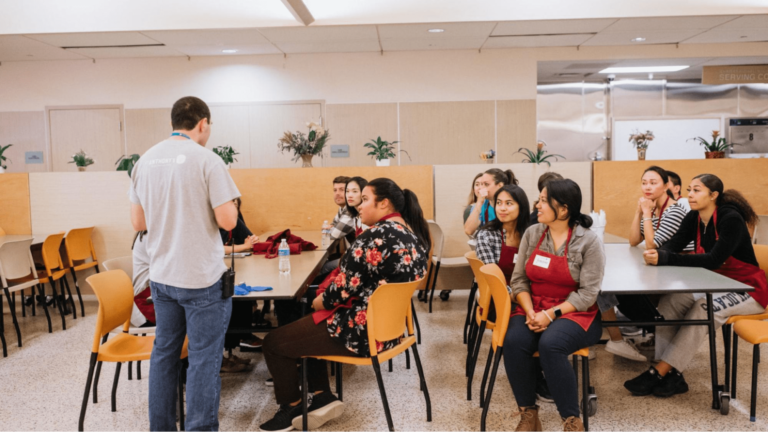Getting cold sweats at the thought of sending out an event feedback form for fear of negative comments?
Well, it’s just those comments you need to transform your events from good to great. Customers want to be heard, and 73% of customers expect businesses to understand their unique needs and expectations.
Embracing feedback and using it to improve your events is a huge hack for increasing ticket sales at your next event. But collecting feedback can be tricky — let’s face it, no one likes filling out tedious forms.
So don’t make it tedious!
In this article, we’ll guide you through the process of creating an event feedback form that your attendees will actually want to complete. After all, we’ve learned a bit from the hundreds of thousands of events we’ve helped organise.
We’ll cover everything from essential questions to tips on design and distribution and even include a customisable template to get you started. Say goodbye to guesswork and hello to actionable insights that will elevate your future events.
Ready to get started? You can download our event feedback form template right here, and read on for insights on how to use it best.
Questions to include in your event feedback form
In the following section, we delve into the most crucial part of the event feedback process: Asking the right types of questions.
Like a post-event survey, an online event feedback form can be an essential tool in your marketing communications. It lets attendees know you care about their thoughts and gives you valuable insights for future events and marketing efforts.
Let’s get started!
Demographic questions
Demographic questions provide insights into your attendees’ backgrounds. This information is crucial to identifying your primary audience, helping in future planning, and making event marketing easier.
For example, knowing your participants’ age group or occupation might influence your choice of speakers, topics, or even the event format in the future.
Here are a few examples of demographic questions:
1. What is your age?
2. What is your job title?
3. Which city/state do you live in?
4. Did you attend this event last year?
Remember, while demographic questions can be useful, they should be optional to respect attendees’ privacy.
Demographic questions can be beneficial for events like Brighton Chamber’s Brighton Summit 24/7. Brighton Chamber’s summits can include speakers and attendees from a variety of age groups and backgrounds, so it’s important to cater to their varied interests and understand how the different groups enjoyed the event.
NPS questions
A Net promoter score (NPS) is a metric used to gauge how likely a person is to recommend your event to someone else. The score is typically based on a single question with a rating scale.
Although you should normally only include one NPS question, the exact wording can vary, like this:
- On a scale of 1 to 10, how likely would you be to recommend this event to your friends and family?
- On a scale of 1 to 10, how likely is it that you would recommend our organisation to a friend or colleague?
- On a scale of 1 to 10, how willing would you be to recommend another virtual experience from the same organiser to a friend or colleague?
- Considering your core experience so far, how likely is it that you would recommend a similar event to a friend or colleague, on a scale of 1 to 10?
These are different variations of NPS questions. It’s important to remember that slight changes in how you word survey questions can dramatically affect results. Depending on the type of event and the precise focus of what you want to measure, you should choose your NPS question carefully.
NPS scores are particularly important when your event’s goal is to bring in as many people as possible. Events like those hosted by Meet My Mate are meant to encourage attendees to bring friends along. The NPS score here would be a key event success metric.
Satisfaction questions
Satisfaction questions allow you to understand whether the event fulfilled attendees’ expectations and help pinpoint areas of strength or improvement.
Satisfaction questions go beyond whether attendees liked or disliked the event. They provide deeper insights into specific aspects like speaker quality, content relevance, value for money, and the overall attendee experience. They typically use rating scales or multiple-choice questions.
Here are some examples of satisfaction questions:
- How would you rate the quality of the speakers?
- How happy were you with the networking opportunities?
- How would you rate the execution of the event?
- How would you rate the quality of the event staff?
- Overall, how satisfied were you with the event?
These questions benefit any event, especially when attendee engagement and satisfaction are key to success. For instance, understanding attendee satisfaction could help the British International History Group’s annual events organisers tweak the event in subsequent years, ensuring it continues to meet and exceed attendees’ expectations.
Feedback questions
Event feedback questions are open-ended questions that focus on collecting qualitative data. They offer a platform for attendees to freely voice their opinions, experiences, and suggestions to the event planners.
This type of question can help uncover specific areas of improvement that predefined options might not capture. Constructive feedback from attendees can also reveal unique insights about your event and offer fresh ideas for future planning.
Here are some examples of event feedback questions:
- What did you like most about the event?
- How was the event registration process?
- Which aspects of the event did you think could be improved?
- Do you have any suggestions for upcoming events?
- Is there anything else you’d like to share about your experience?
Feedback questions are particularly valuable when you host frequent branded events. They can help you quickly implement valuable feedback in your next events and see how changes affect event attendees’ responses. You can even use Evenbrite’s analytics tool to help you understand how your changes impacted your events.
Looking for a great tool to stay in touch with past event attendees?

Yes/no questions
Yes/no questions are direct, binary questions that require attendees to respond with a simple “yes” or “no.” They are highly effective in gathering feedback on specific aspects of the event.
They can be very effective for collecting negative feedback where attendees can otherwise be shy. They’re ideal for events that have a lot of different parts you want to evaluate without overwhelming the respondents.
Here are some examples of yes/no questions:
- Did you recognise the event sponsors?
- Were you satisfied with the food and beverages provided?
- Were you happy with the audio quality at the event?
- Did you have a positive experience overall?
- Would you attend this as a virtual event/in-person event?
Because yes/no questions are useful for complicated events, they’re a great fit for multi-day events like Mindful Yin Yoga with Emilia Gzyl’s yoga retreats. These questions can help organisers break down which aspects of their events were the most successful and which ones to focus on improving.
Event feedback form best practices
To ensure that your event feedback survey is not only effective in gathering the necessary data but also user-friendly, let’s discuss best practices and how you can obtain a higher completion rate.
What kind of feedback to seek in your feedback form
Different types of events will benefit from different kinds of feedback. SASH Maternity Education’s events mainly focus on teaching skills about birth and labour. They would likely benefit from asking open-ended questions on the quality of instruction, information retention, and usefulness of the course contents.
On the other hand, BennyBoy Events is likely more interested in conducting event feedback surveys about the quality of entertainment and ambiance at its bowling parties.
The important part is to keep the feedback you’re seeking in sync with your event goals.
How many questions to include in your event feedback form
In general, it’s ideal to have as few questions on your event feedback form as possible while collecting the information you need. One study showed over an 80% completion rate for forms with three or fewer questions, which fell to almost 40% for those with 15 questions or more.
Keeping the feedback form to around eight questions or fewer is a great way to balance optimising your response rate with getting enough information for data-driven insights.
How to increase your response rate
Speaking of response rate, decreasing the number of questions on the form isn’t the only way to improve it! You can also:
- Provide incentives, like raffle entry for a gift card
- Ensure your questions are relevant and easy to understand
- Make less essential questions optional
- Send follow-up reminders to those who don’t complete the form quickly
- Send your event feedback form as soon after the event as possible
The more information you can gather from your event feedback form, the more data-driven decisions you can make for your future events.
Use feedback forms to take your event to the next level
Feedback forms are your gateway to a successful event evaluation. They provide valuable insights into your event attendees’ experiences, preferences, and expectations. They help you measure satisfaction, identify areas of improvement, and tailor your future events to better suit your target audience’s needs.
However, to truly harness the power of these insights, you need easy-to-use event software like Eventbrite. With our event survey tool and sophisticated analytics, you can create, distribute, and analyse feedback forms without any hassle, amplifying your event’s impact.






